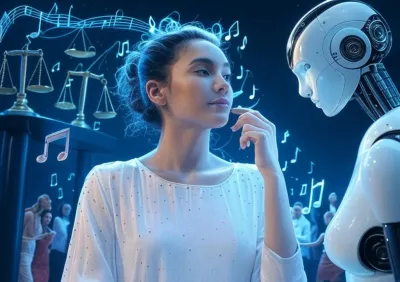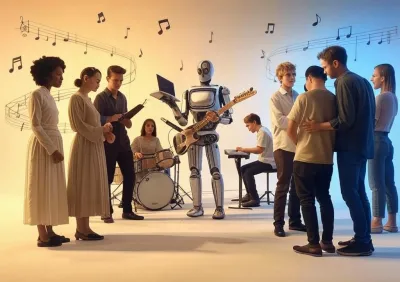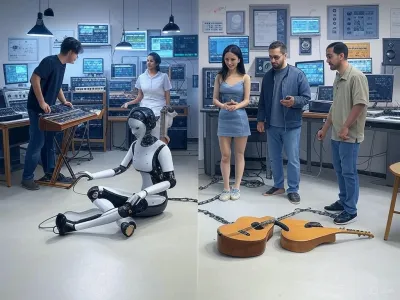In the ever-evolving world of music, where innovation has long been the heartbeat of progress, a new player has emerged: artificial intelligence. By 2025, AI-generated music—songs, beats, and even lyrics crafted by algorithms—has moved from a futuristic curiosity to a mainstream phenomenon. Tools like Suno, AIVA, and OpenAI’s MuseNet are no longer just experiments; they’re producing chart-worthy tracks, collaborating with human artists, and sparking heated debates about creativity, ownership, and the very soul of music. As AI reshapes the industry, it raises profound questions: Is this a golden age of limitless creation, or a threat to the human artistry that has defined music for centuries?
The Rise of AI in Music Creation

The seeds of AI-generated music were planted decades ago with early experiments in computational creativity, but the past few years have seen an explosion of capability and accessibility. By 2025, AI systems can compose entire songs in minutes, blending genres, mimicking styles, and even generating vocals that sound eerily human. Companies like Suno allow users to input a prompt—“a jazzy breakup ballad” or “an upbeat EDM festival banger”—and receive a polished track complete with melody, harmony, and lyrics. Platforms like Amper Music and Soundraw cater to content creators needing royalty-free background scores, while more advanced systems collaborate with artists to push creative boundaries.
The technology behind this revolution is rooted in machine learning, particularly deep neural networks trained on vast datasets of existing music. These algorithms analyze patterns—chord progressions, rhythmic structures, lyrical themes—and extrapolate them into original compositions. Some systems, like Google’s Magenta, focus on enhancing human creativity by suggesting ideas, while others aim for full autonomy. The result? A flood of AI-crafted music infiltrating streaming platforms, social media, and even live performances.
Take the case of “Echoes of Tomorrow,” a 2024 viral hit on TikTok. Marketed as a collaboration between a mysterious producer and an AI named Lyra, the song’s pulsating synths and haunting lyrics captivated millions—only for fans to later discover Lyra wasn’t a human vocalist but an AI voice model. The track’s success underscored a new reality: AI music isn’t just a gimmick; it’s a contender.
Creativity: Machine vs. Muse
At the heart of the AI music boom lies a philosophical debate: Can a machine truly be creative? For centuries, music has been a human endeavor, born from emotion, experience, and imagination. A Beethoven symphony or a Billie Eilish confessional carries the weight of lived struggle and triumph. AI, by contrast, doesn’t feel heartbreak or ecstasy—it processes data. Critics argue that its output, while impressive, lacks the soul of human art. “It’s mimicry, not mastery,” says veteran producer Rick Rubin in a 2025 interview. “A machine can replicate patterns, but it can’t bleed into the notes.”
Yet proponents see AI as a new frontier of creativity, not a replacement. Artists like Holly Herndon, a pioneer in AI music, argue that these tools amplify human potential. Her 2023 album Proto, created with an AI called Spawn, blended her voice with machine-generated harmonies to explore the symbiosis of human and artificial minds. “AI isn’t here to take my job,” Herndon says. “It’s a collaborator, like a bandmate who never sleeps.” For bedroom producers and indie artists, AI democratizes music-making, lowering barriers once guarded by expensive gear and technical expertise.
The data backs this optimism. A 2024 report from the Music Industry Research Association found that 62% of independent musicians had experimented with AI tools, with many citing them as a source of inspiration. AI can churn out dozens of drafts in the time it takes a human to sketch one, offering a sandbox for experimentation. Pop star Tinashe, for instance, used AI to generate beats for her 2025 single “Flicker,” tweaking the results into a polished club anthem. “It’s like having a co-writer who’s infinitely patient,” she told Rolling Stone.
Still, the “soul” question lingers. When an AI composes a love song, is it art—or an algorithm guessing what humans want to hear? Neuroscientist Daniel Levitin suggests it’s both. “Creativity isn’t just spontaneity; it’s pattern recognition and recombination,” he argues. “AI excels at that, even if it doesn’t cry over the chords.”
Copyright Conundrums
If creativity is contentious, copyright is a legal minefield. Who owns an AI-generated song? The programmer who built the system? The user who pressed “generate”? The AI itself? Traditional copyright law, built for human creators, struggles to adapt. In 2025, the U.S. Copyright Office still holds that only works with “human authorship” qualify for protection—a stance challenged by a growing wave of AI music disputes.
Consider the 2024 case of AI vs. Aria, where a small label sued a TikTok creator over a track generated by an AI trained on their catalog. The creator argued the song was original, but the label claimed the AI’s output infringed on their artists’ melodies. The court ruled in favor of the label, setting a precedent that training data matters. “If an AI learns from copyrighted songs, its creations can carry that DNA,” explains intellectual property lawyer Sarah Chen. “It’s a Pandora’s box for the industry.”
This ruling has ripple effects. Major labels now guard their catalogs fiercely, while AI developers scramble to use public domain works or synthetic datasets. Startups like Voicemod, which offers AI vocal cloning, face lawsuits from artists whose voices were mimicked without consent. Meanwhile, some musicians embrace the chaos, licensing their styles to AI platforms for a cut of the profits. Drake, for example, partnered with an AI firm in 2025 to create “DrakeBot,” a tool that generates tracks in his signature flow—royalties included.
The debate extends to ethics. Should AI music be labeled as such, like a “contains nuts” warning? Streaming platforms like Spotify are split: some tag AI tracks transparently, while others let them blend in, fueling accusations of deception. Listeners, too, are divided—surveys show 48% don’t care who (or what) made their music, as long as it slaps.
Impact on Human Artists

For every artist embracing AI, another fears obsolescence. The numbers are stark: AI-generated tracks now account for an estimated 10% of new music uploads on SoundCloud, up from 2% in 2022. In commercial spaces—ads, video games, YouTube intros—AI scores dominate, offering cheap, customizable alternatives to human composers. “Why pay $5,000 for a jingle when an AI can do it for $50?” asks a music supervisor at a 2025 industry panel.
Job displacement is real. Session musicians and entry-level producers feel the squeeze as AI handles tasks once requiring human hands. A 2024 study by Berklee College of Music found that 30% of freelance composers reported lost gigs to AI tools. “It’s not just about losing work,” says guitarist Maria Torres. “It’s about losing the process—the jam sessions, the happy accidents.”
Yet the flip side is opportunity. AI can’t (yet) replicate the charisma of a live performer or the cultural weight of a human icon. Superstars like Beyoncé or Kendrick Lamar thrive on authenticity AI can’t fake. Smaller artists, meanwhile, use AI to compete, producing polished demos without breaking the bank. Nigerian artist Rema credits AI tools for his 2025 EP Afrowave, which fused traditional beats with machine-made textures, earning global acclaim.
The industry is adapting. Music schools now offer AI production courses, and labels scout talent who can wield these tools effectively. “The future isn’t AI replacing artists,” says Universal Music Group’s digital chief. “It’s artists mastering AI.”
The Cultural Shift
Beyond economics, AI music is reshaping culture. On TikTok, AI-generated snippets fuel dance challenges, blurring lines between human and machine creativity. In gaming, adaptive AI soundtracks—like those in Cyberpunk 2077: Redux—react to player choices, immersing users in ways static tracks can’t. Even classical music sees disruption, with AI composing “lost” Mozart symphonies based on his surviving works.
Fans are part of the shift. Playlists like Spotify’s “AI Chill Vibes” top charts, while niche communities on X debate the merits of machine-made metal versus human shredding. Some embrace the novelty; others reject it as soulless. “I want music from someone who’s lived, not something that’s computed,” one X user posted in 2025, echoing a sentiment that divides generations.
Looking Ahead
As AI music matures, its trajectory is unclear. Will it become a dominant force, relegating human artists to a niche? Or will it settle as a tool, like the synthesizer before it, enhancing rather than eclipsing the human touch? By 2030, experts predict AI could generate 25% of commercial music, but cultural pushback may cap its reach. “People crave connection,” says sociologist Mia Jackson. “AI can simulate it, but not sustain it.”
For now, the industry stands at a crossroads. AI offers unparalleled speed, scale, and accessibility, challenging notions of authorship and artistry. Yet its rise amplifies what makes human music irreplaceable: the messy, imperfect spark of a mind alive with feeling. As algorithms churn out hits, the question isn’t just “Can AI make music?”—it’s “What do we want music to mean?”
In 2025, that answer remains unwritten. But one thing is certain: the beat goes on, human or not.




Leave a Reply